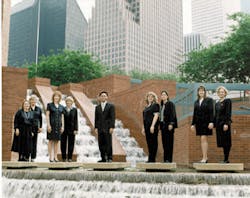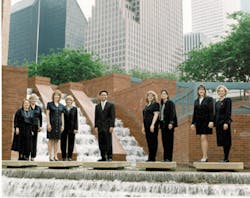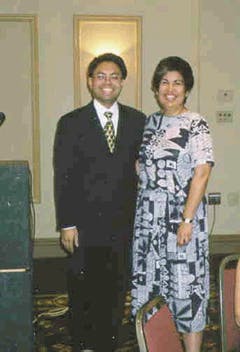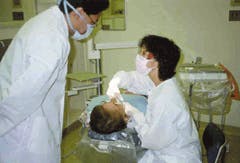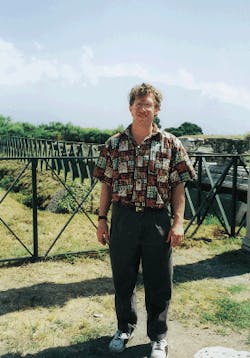A Man Who Leads
Houston hygienist takes an active role in the profession`s leadership.
Shirley Cross, RDH, BS
When I met with Harold Henson of Houston, I had just moved from Anchorage, Alaska, to Sugar Land, Texas. I was looking for some interesting ways to use my creative writing abilities. When I first called Henson and asked if I could interview him for RDH, he told me that it would be several weeks before our schedules would fit together in his busy life. I was taking advantage of an opportunity to write an article about the first male dental hygienist to become president of a major component in Texas. So while I waited, I read an article printed in the Texas Dental Hygienists` Association`s newsletter. The headline was, "An elegant affair as Greater Houston Dental Hygienists` Society installs first male president, Harold Henson, BS, RDH."
This historic event occurred on May 4, and it was a formal and elegant evening. With beautiful table settings, a string trio, and long-stem roses for every past president, Harold (wearing a tuxedo) and the other officers for the Greater Houston area were installed. This glitzy affair turned out to be quite a memorable evening, as far as installation ceremonies go.
I was really looking forward to meeting this exceptional male hygienist. I had asked him some preliminary questions during our initial telephone conversation. He was very gracious and answered all of my questions. Harold Alonso Henson was born in Manila, Philippines, on January 20, 1967. Harold is the only child of Valentino and Leticia Henson, who now live in Pasadena, Texas. Harold`s family moved to the United States when he was two years old. His mother, a registered nurse, was offered a job in Houston`s Methodist Hospital. Henson became a U.S. citizen on April 30, 1976. He attended elementary, junior high, and senior high schools in Pasadena, and then went on to get his bachelor`s degree in biology from the University of Houston in 1992.
I was grateful that Henson had answered those first few questions. But now I was really curious about why Harold chose a career in dental hygiene. His story is a fascinating one about his courage and strength to follow a dream and see it come to fruition.
When we finally met, Henson provided me more insight about his personality and passions in life. Dental hygiene and teaching are his passions. Henson chose a profession that is not embraced by the majority of males. But he is a "trailblazer" and a very capable one at that.
I asked Harold why he decided to go into dental hygiene. After receiving his bachelor`s degree, Henson examined the options available to him. They included teaching at a high school or university, or going into research, which meant staying inside a laboratory much of the time. Henson said that he is a "people-person," and he needed social interaction in his life. His parents encouraged him to continue his education until he found his niche in life.
Henson was a patient in Dr. Gail Campbell`s dental practice in Pasadena, and his dental hygienist was Jayne McWherter. As Henson passed through the hallways, he noticed the diplomas belonging to the hygienists. The diplomas intrigued him. He asked McWherter about a career in dental hygiene, and he began to seriously consider it. Since he did not really understand what type of education was necessary for dental hygienists, he sought Jayne`s advice and answers. McWherter`s wall even had a master`s of education degree from the University of Houston on it, so Henson weighed the options of both clinical hygiene and teaching hygiene, as well as the possibility of going to medical or dental school. He decided the curriculums for medical and dental schools were just too long and drawn out for him.
He applied at the University of Texas, Houston Dental Branch, Dental Hygiene Program. Henson knew that he needed to take anatomy, physiology I and II, and speech as prerequisites, so he attended San Jacinto College in Pasadena. He also worked for the Pasadena Independent School District as a substitute teacher.
Henson`s first attempt to get into the dental hygiene school was not successful, since the class was already filled for the next year. However, "as luck would have it" (in Harold`s own words), someone dropped out of the program at the last minute. Nina Infante, director of the school of dental hygiene, called and offered Henson the open spot. He jumped at the opportunity to further his education.
When Harold began his studies in the fall of 1993, he discovered that his personal dental hygienist, McWherter, had left private practice and was now the clinical dental hygiene coordinator for second-year students and also was an assistant professor. He called McWherter by her first name only one time at the school. She politely took him aside and informed him that he would now have to address her as "Mrs. McWherter" from that point forward during his next two years at the school.
When looking for jobs in Pasadena and Houston, Henson said that he had no problems in finding work, and he did not notice if gender had any bearing on his ability to obtain positions. In 1995-96, he worked part-time in the Pasadena practice of Drs. John Garza and Glenn Garrison. Harold said that patients sometimes mistook him for the dentist, but he didn`t see that as a problem. He also said that most patients do not really understand the education and professional abilities that dental hygienists must possess before they are granted a state or regional license.
"It is our job to teach our patients exactly what we do," Henson states emphatically. He also said, "Dental hygienists should hang those diplomas on the wall where patients can see them."
When I asked Henson if he had any advice for male candidates for dental hygiene school, he said that he encourages males to consider dental hygiene. The flexible hours and different settings (including private practice, public health, or academic) are good reasons for anyone to consider a career in dental hygiene.
He does voice his opinion about some dentists who do not offer medical insurance plans or retirement plans. He said males, if they are the primary wage-earner in a family, have to consider the lack of benefits in the profession. But he was equally quick to point out that "the only adversary you have is yourself sometimes." He added that, when you go in to interview for a job, you need to set your goals firmly in your mind and ask for exactly what you want and need during the interview. He believes that, sometimes, hygienists are their own worst enemies, becoming timid when asking about benefits. He said that this is not a "gender issue," but an issue that affects all dental hygienists.
When he graduated from dental hygiene school in May 1995, Harold received a telephone call from Hope Garza, who is currently the president of the Texas Dental Hygienists` Association. Garza offered Henson the opportunity of being the public relations chairman for the Greater Houston Dental Hygienists` Society. Although he admits not knowing what he was doing, Harold went right to work, relying on the guidance of many mentors in Houston`s dental hygiene community.
Henson was very expressive when he described a letter written to Governor George W. Bush. Harold asked the governor to sign a proclamation for National Dental Hygiene Month in October 1996. Harold was rather skeptical about whether he would hear from the governor`s office in Austin. But, after only four weeks, an aide called and asked Harold to fly to Austin for a ceremony. Along with other hygienists from the Austin area, Harold was present when Governor Bush signed the proclamation. Harold proudly hangs the photograph in his office at the University of Texas Dental Hygiene School.
Now I need to explain how Harold ended up having an office at the dental hygiene school. In 1996, Harold volunteered at the school as a clinical assistant professor. He was not paid, but he freely gave of his time and talent. Nina Infante, the program`s director, said Henson develops a "wonderful" rapport with students. The dean of the dental school, Dr. Ronald Johnson, also was aware of Henson`s many talents and excellent clinical skills. Henson chuckled when he recalled that the hardest thing for him to do was now to call the instructors by their first names.
Harold enjoyed the volunteer work as a clinical instructor, but he felt that he needed to return to full-time practice, earning money to pay back college loans. He later realized the decision was a good one, since full-time practice gave him confidence as he developed the skills and expertise necessary for private practice.
When a part-time paid position at the school became available in 1998, Infante asked Harold if he would like to apply. Henson accepted the position and currently works three days a week as a clinical instructor and as a guest lecturer on different topics as needed. He still works in private practice one day a week and three Saturdays a month. The author of several articles, Henson also volunteers much of his free time to community service projects at the San Jose Clinic, the Northwest Assistance Ministries, or the Star of Hope Mission. He places sealants and provides oral-health screenings for children of low-income families.
Henson drove me over to the dental hygiene school and introduced me to Infante. Nina willingly gave me some personal insights into this delightful male hygienist and instructor. She said that Henson was a very focused and energetic student. She said, "Harold had to put up with a lot of ragging and teasing from his fellow students, especially because he was the only male dental hygiene student in his class." She said he responded very well to their joking, and he also was able to straighten out some differences among his classmates. He had the ability to get his peers to focus and get back on track. Henson led the Student American Dental Hygienists` Association (SADHA) as president during 1994-95 and was a student delegate for the Texas Dental Hygienists` Association Annual Session that same year. In May 1995, Harold was awarded the "Outstanding Professional Leadership" award from the Greater Houston Dental Hygienists` Society.
When the search was conducted for the part-time opening at the school, Infante said there were many reasons why the search committee wanted Harold on board.
"Harold has a good sense of humor, and he has an objectivity and a sense of fairness toward everyone. With his good clinical and communication skills, along with his high energy level, Harold was our first choice," Infante said, adding, "Harold is one of the most patient instructors that I have met. Learning clinical skills can be very difficult for some students and, therefore, can be taxing on an instructor. Harold will take the time to demonstrate a particular task over and over until the student gets the hang of it.
"He never shows frustration or impatience with the student. He makes the students feel as if he came to the clinic to work specifically with that student that day - and only that student."
Infante said the school accepts 40 students in each class, and it`s not unusual to have one or two male students in each class. She feels that males entering the profession will strengthen it. She said, "Having a mix of male and female personalities and traits should give a nice and necessary blend to our profession and will allow it to continue moving forward."
But, she was quick to point out, Henson was an exceptional student because of his abilities - not because he is a male.
As far as long-range goals are concerned, Henson said that he wants to continue taking classes for three more years until he receives his master`s degree in education. Then he would like to pursue a doctorate degree in education, which could take three to five more years. He would like to be considered for a position as director of a dental hygiene program. He wants to remain in private practice so that he can maintain his skills and dexterity while teaching in a clinical setting.
As for his personal life, Harold said, "I have been so focused on being a student, a good dental hygienist, and a good representative for the GHDHS, and now a clinical instructor, that I have not had time to date or even think about my personal life. I do plan on changing my priorities so that I can give more time to that endeavor."
As I was finishing this article, I received a call from a veteran dental hygienist in Houston, Anne Guignon. As we talked about our profession and different interests, I asked Guignon if she knew Henson. Anne told me that Harold had put together her wedding videos and had made custom baroque classical audiotapes for her wedding. She could not say enough nice things about Henson. In addition to these skills, I remembered that Henson told me his father owns a business called "Music Makers." Through that business, Henson became a disc jockey at parties for friends and other customers. From being a disc jockey all the way through school to pursuing his dream to become a dental hygienist and educator, I`m confident that we may just be watching this talented dental hygienist rise through the leadership of state level and, possibly even national level, of organized hygiene.
As the component president, Henson hopes to continue his goals to promote public awareness of the profession, interacting with other health care agencies to promote not only good oral health care but overall health. As a very capable and confident leader, Harold hopes that his message goes out to all area hygienists in the new millennium that we are not only clinicians but, more importantly, educators.
Henson hopes more men consider dental hygiene as a viable career option. In his opinion, the nursing field has certainly changed its views about male nurses over the years. Another interesting quote from Infante is, "Most males who graduate now and become practicing hygienists seem to be strong individuals. They are not timid in speaking up and may have a different perspective on various ideas in general, or they would not be in a very different profession for males - just as the women pioneers entering medicine were strong personalities and could not be timid."
She also added, "Because of these personality traits, people are drawn to these individuals." Infante is right. Henson is one of those people who knows how to draw you out and hear what you have to say. During our encounter, he asked for my opinions, knowing that I have more than 30 years of experience. That is another positive trait that he has perfected. Henson knows that he will face many challenges during his years as a clinical instructor, as a vocal advocate for his profession, and in the rigors of completing his educational goals. The reality is that we must be ready to meet the challenges of the new millennium and beyond, and it?s my prediction that Harold will be leading hygienists in positive and beneficial ways for years to come.
To contact Henson, RDH readers can e-mail him at [email protected].
Shirley Cross, RDH, has been a practicing hygienist for 30 years, holding licenses in Oklahoma, Texas, and Alaska. A 1969 graduate of Baylor University Dental Hygiene School in Dallas, she currently resides in Sugar Land, Texas.
Harold Henson (center) poses with other officials of organized hygiene in Texas: (from left to right) Deborah Simacek (TDHA trustee), Kim Hanford, Marcia Boyd, Nancy Johnson, Andrea Scott, Michelle Brightwell, Stephanie Bass, and Laquita Andrews.
Henson, left, poses with Hope Garza, president of the Texas Dental Hygienists` Association.
Henson monitors the progress of Raquel Martinez, a second-year student at the University of Texas, Houston Branch Dental Hygiene School.
Doing `something` in Florida
Editor`s note: Howard M. Notgarnie, RDH, BA, is a dental hygienist in Coral Beach, Fla. Jane Weiner, RDH, a hygienist in Tamarac, Fla., had the following conversation with Mr. Notgarnie.
s What made you become interested in becoming active in the Florida Dental Hygienists` Association?
I`ve been the treasurer of FDHA since October 1998. I was elected and installed at the last annual session despite the lack of cooperation by Hurricane Georges. These last six months have been busy for me, but that`s normal. I like having worthwhile activities. This is my way of serving the community. I like to put in time and effort for the causes that interest me.
As far as dental hygiene organizational activity goes, I`ve been involved almost constantly since the beginning of my studies in dental hygiene school. During my first semester (January 1991), I ran for president of FSADHA, but I lost. It`s probably good that I did not become president then, because I did not understand the professional and political issues dental hygienists face until several years later.
In January 1993, I moved to Cape Coral, participated in the meetings - some might say `opened my big mouth` - of the Gulf Coast Dental Hygiene Association and became one of the callers on the telephone tree. In October of the same year, I became treasurer of GCDHA and coordinator of the educational program we provide to the elementary public school students. In October 1994, I started a two-year service as president of GCDHA. Then, from 1996 to 1998, I was a delegate to FDHA representing GCDHA. From 1997 to 1998, I was also a FDHA finance committee member for a one-year term.
My interest in becoming active is because I don`t want to be part of the 80 percent of people who do nothing but sit around and complain about the way things are. I know that what I do is just a small drop in the bucket. But there are enough people who care to make the bucket overflow, if they can just get motivated. The human rights organization I was in was small, but we were vocal enough to encourage our university to participate in the economic pressure placed on South Africa, and that pressure, when combined with all the others, helped to topple the apartheid government.
I like the way my dental hygiene school instructor, Nancy Macpherson, put it to our class when we were graduating: "Remember how you used to say, `I wish they would do something...` Well, now you are they."
s How many males were there in your class at Palm Beach Community College? How did the female classmates treat you? Were you included in all of the activities?
I was the only male in my class, and the first male in the PBCC dental hygiene program. I think my classmates were glad to have a male classmate for a change. Overall, the class was a close-knit group, and there was no sexism. We did notice, however, that among the inner circle in which I was a part, five of us did not fit the mold that people seem to associate with dental hygienists. But I don`t think that was because of ostracism. We gravitated toward each other because we understood each other. Except for the locker room, I was included in all activities.
s How were you viewed by your instructors?
When I first entered dental hygiene school, I was viewed as being able to provide much to the school because of my educational background (a bachelor`s degree in chemistry and three years of dental school), but I think some teachers saw, rightly so, that I had a bit of hostile snobbishness. I later realized that was my way of covering some personal insecurities. Intentionally or not, they did help to bring me to a healthier medium.
By the end of the program, I think all of the instructors saw me in a positive light. Nancy said she hopes I stay in this profession. We both have the same type of energy toward our work and our community-oriented motivations.
s When you graduated, was it difficult to find a job?
During the first three years after graduation, I worked in more than a dozen different dental offices. I could have stayed in the first office as long as I wanted, but there were several things I did not like about that area. Where I live now, employment opportunities do not seem to be a problem, but finding a stable office with compatible interests is difficult. I`ve been working in my current office for more than three years.
s What first got you interested in dental hygiene, and did you research how males fare in this predominantly female profession?
I did not research the profession. I`m sorry to say that, at the time, I was only finding a way to get a degree with the knowledge and skill I had. Only later did I realize the importance of preventive health care in my career. I`ve always done things differently than the norm, so I wasn`t worried about the issue of being a male in a predominately female profession.
s Do you find that the patients are more receptive to care from you than a female hygienist? Or do you feel that the patients shy away from a male hygienist?
Some are surprised about having a male hygienist, but I`ve never heard of somebody insisting on a female hygienist. I`ve had two offices that cut down my hours after at least six months of working and claimed it was due to my being a male. However, both of the offices in question were notorious for creating excuses and bad attitudes toward their hygienists.
There was one office I was planning to work for as a temp. I was told by the temp agency not to go because the dentist said, "I won`t have a male hygienist working in this office." So it seems patients are more receptive than dentists to having a male hygienist. I get more people mistakenly calling me "Doctor" than do the females I have worked with. I think these are the same people who tell me they scheduled their appointment with the "nurse" at the front desk.
- Are the salaries offered to you the same as to the women whom you know in this profession?
I`m being paid a little less than other hygienists in the area, but it`s full-time, which is typically less, and it`s in a managed care office, which seems to be an excuse to lower income for everybody.
- Are the dentists ready to utilize you to the fullest capacity, or do you think that they shy away due to feeling intimidated by a male?
First of all, I am employed; instruments are utilized. Most dentists don`t seem intimidated by male employees, but I think those who own offices seem intimidated by hygienists, whether male or female, because we have the capacity, through educating our clients, to severely cut into their profits. That is why every skill we have is associated in their minds as a step toward independent practice and why they are trying to convince legislators to permit unskilled employees to perform dental hygiene work.
- Do you find the thought of preceptorship threatening?
Yes, I believe preceptorship threatens our profession, our careers, and consumers. But in the long run preceptorship will not prevail. Whenever I tell clients or acquaintances about the policies ADA has been coming up with the past few years, they are horrified at the thought of unlicensed, unskilled, and uneducated people providing the services that we do.
- Do you perform oral-cancer screening on patients ... and how do the women feel about the thyroid and neck part of that exam? Are they accepting and trusting of you?
I generally don`t palpate outside the oral cavity during hygiene procedures unless the patient has a specific concern. I`ve never had any negative feedback in that regard. I have pointed out lots of lesions intraorally and extraorally and referred to oral surgeons or dermatologists. Most seem very appreciative.
Readers interested in contacting Mr. Notgarnie can reach him at [email protected]. Ms. Weiner can be reached at [email protected].
Howard Notgarnie
